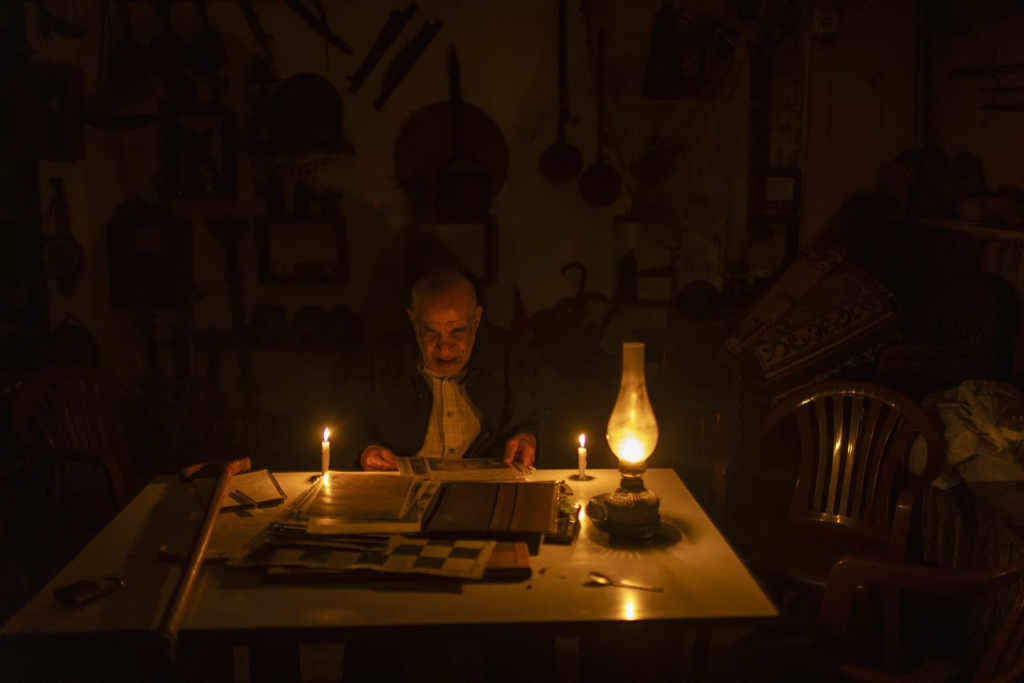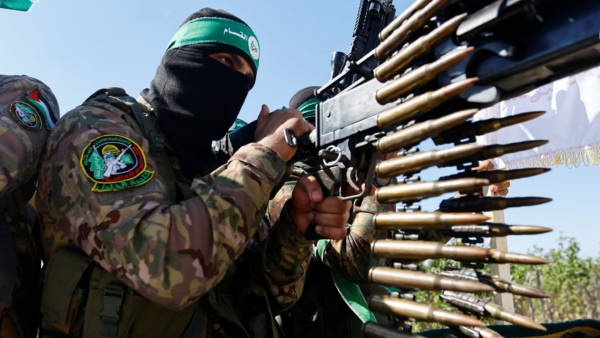A poster of a Hamas fighter . As far as the Palestinian refugees in Lebanon are concerned, Hamss replaced the PLO. “Everyone is now Hamas’ . They want “the war will continue until liberation”
By Jane Arraf
BEIRUT — In the streets of the Shatila refugee camp, late Palestine Liberation Organization leader Yasser Arafat’s image is still painted on concrete walls.
It’s been 20 years since Arafat’s death, and 42 years since he was expelled from Lebanon — his home in exile — along with thousands of Palestinian fighters. Most banners continue to declare loyalty to Fatah, the Palestinian political faction he founded, which is a rival to the militant group Hamas.
But since war broke out between Israel and Hamas in October, residents of the Shatila refugee camp in Beirut now firmly support Hamas. The peace plan that Arafat signed in 1993 with Israeli Prime Minister Yitzhak Rabin seems like an improbable dream.
Now with each day bringing new media images of the dead and wounded in the Gaza Strip, it’s war and not peace that’s on the mind of most Palestinian refugees.
The streets of the camp are crammed with market stalls and motorbikes. Snarled electrical wires hang between tall concrete homes built on tiny land plots that many believed would be temporary refugee camps for Palestinians who were forced from or fled their homes across the Lebanese border. The settlement has become painfully permanent.
The camp and dozens of others in the region were established a few months after the 1948 war that led to the creation of the state of Israel. Today Shatila is also home to people from Syria, Egypt, Iraq, Bangladesh, and other countries who can’t go home or can’t afford to live anywhere else.
But the heart of this camp is Palestinian. And its scars, from the loss of their homeland in 1948 and the Shatila massacre in 1982, have been reopened by the war in Gaza.
A museum preserves Palestinian memories
While much has changed in the camp over the decades, Palestinians cling to memories and mementos of home as an important part of identity.
Down a tiny alleyway with peeling paint, Dr. Mohammad al-Khatib unlocks the door next to a handwritten sign reading “Museum of Memories.”
The electricity comes on only a few hours a day in the camp and the windowless room is completely dark. Khatib, who is 76, lights a kerosene lamp that belonged to his grandmother, its base decorated with glass beads.
“We have returned back 100 years,” he says, referring to the glow of the kerosene flame.

Mohammad al-Khatib, 75, is director of the Museum of Memory in Shatila, on the outskirts of Beirut. A one-room museum in a Shatila alleyway preserves objects and memories from Palestinian history.Diego Ibarra Sánchez for NPR
Khatib was just a few months old in 1948, when everyone in his village fled to Lebanon for what they thought would be a few weeks. Seventy-five years later, he says his family home in northern Israel still stands, taken over by a Jewish Israeli family. He knows that, he says, because a relative with a Western passport went back a few years ago and knocked on the door.
Khatib takes the lamp over to two wooden models of houses set on a table top. Each model is painstakingly detailed, down to the black and white checker pattern on the floor.
He says they were created by an 82-year-old man who wanted to make sure he didn’t forget what his grandfathers’ homes looked like.
A militia killed hundreds in the camp
In one wood and glass case in the museum, there is an ax. “This was one of the axes that was used in the 1982 massacre,” Khatib says.
His mind often returns to the day 42 years ago when Lebanese Christian militias aligned with Israel entered the Sabra neighborhood of Beirut and the adjoining Shatila camp — slashing, stabbing and shooting hundreds of civilians.
The militias were on a rampage after the assassination of then-Lebanese President-elect Bashir Gemayel, which they wrongly blamed on the PLO. A Lebanese member of a Syrian party later admitted his part in the killing and a court in Lebanon convicted him in absentia in 2017.
Israel had invaded Lebanon earlier that year in what it called retaliation for attacks by the Palestine Liberation Organization. A week after, Lebanon expelled the PLO, leaving camps like Shatila unprotected.
In September of that year, Israel let the militias into Shatila and sealed off the camp. An Israeli commission later found Israel “indirectly” responsible for the massacre.
Estimates for casualties in the massacre vary. A Lebanese historian conducting field work after the massacre identified 906 dead and 484 missing in field work after the massacre.
The United Nations General Assembly termed it an act of genocide.
Khatib, who studied medicine in Lebanon and Spain, says he was on duty at a U.N. hospital in the camp when the massacre began.
“Orabi was an Egyptian who worked at the hospital. He said to me, ‘Today we will all be killed,’ ” Khatib says. He says he later saw his friend’s body — he had been shot in the face and in the live
Khatib says once most Palestinians believed they could regain their homeland and live in peace with Israel, but now Israeli Prime Minister Benjamin Netanyahu vows not to allow the creation of a Palestinian state.
“So what do you think when a Palestinian hears that, when the Palestinians see the massacres that are now happening in Gaza?” Khatib says.
He says there’s renewed hope of a Palestinian state, but not through peace talks — through force. It’s a sentiment heard throughout the camp.
While the massacre faded into memory, the media images of children being killed in Israel’s offensive in Gaza are relentless.
Gaza’s Health Ministry says Israel’s bombardment of the territory has killed more than 25,000 Palestinians, including more than 10,000 children. Israeli leaders say the aim is to destroy Hamas after the militant group’s Oct. 7 attack in southern Israel killed 1,200 people and took 240 hostages back to Gaza.
“The war will continue until liberation”
Near a crowded vegetable market in Shatila, a simple granite monument rests in a field containing a mass grave for massacre victims in 1982 — those who couldn’t be identified or had no relatives to bury them.
The parents and younger sister of the monument’s caretaker, Adnan al-Maqdad, were among the victims.
Maqdad has just been watching news of the Gaza war on a battery-powered TV in a tent.
“A truce is difficult now,” he says. “But the war will continue until liberation.”
At a shop selling small toys, the owner, Nohad Ma’rouf, says she has to believe that the killing of children in Gaza will result in a Palestinian homeland through “determination, fighting, war, and faith.”
She says even people in the camp who didn’t support the militant Palestinian group that rules Gaza before, do now.
“Everyone is now Hamas. They have the right to fight — to enter Israel,” she says, referring to the Oct. 7 Hamas attack. “For 17 years, they have been besieged.”
Down the street, a former PLO fighter, 67, with a black-and-white scarf, known as a keffiyeh, around his neck, sits on a plastic chair in front of a shop.
He won’t give his name because he’s afraid Israel could hunt him down. He says he witnessed the 1982 massacre and survived by hiding in the trees.
But somehow, he says, seeing children killed in Gaza on television is worse. He, too, is convinced his homeland will be regained soon by force.
“How? I’ll tell you how — with the determination of the youth and their faith in God,” he says.
After 75 years of despair, people here believe the war in Gaza, no matter how bloody, could be a path home.
NPR


Leave a Reply
You must be logged in to post a comment.